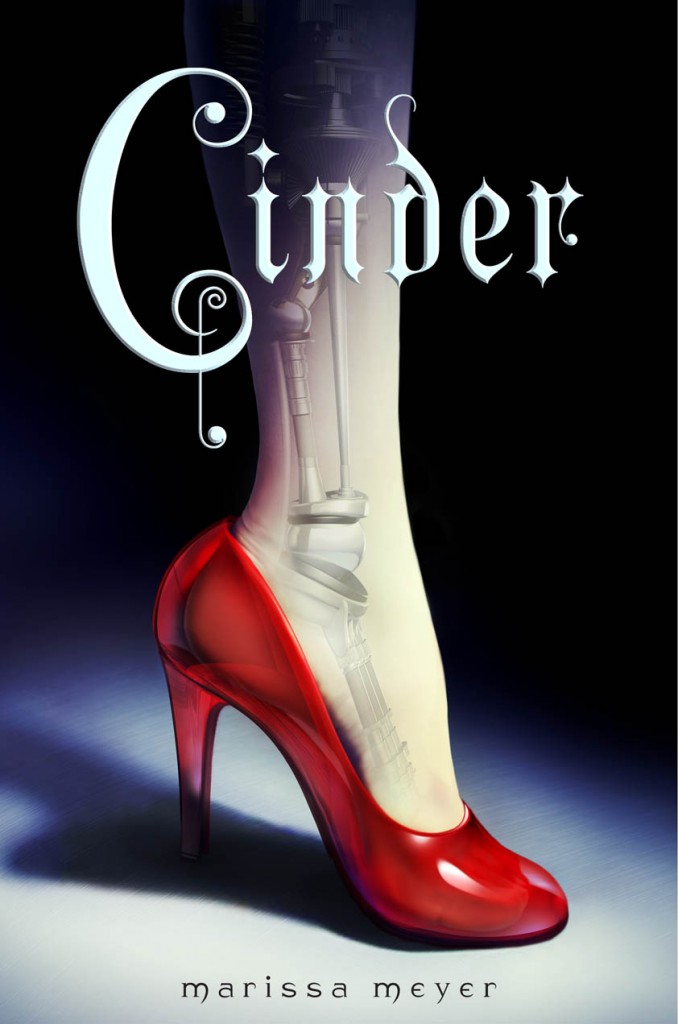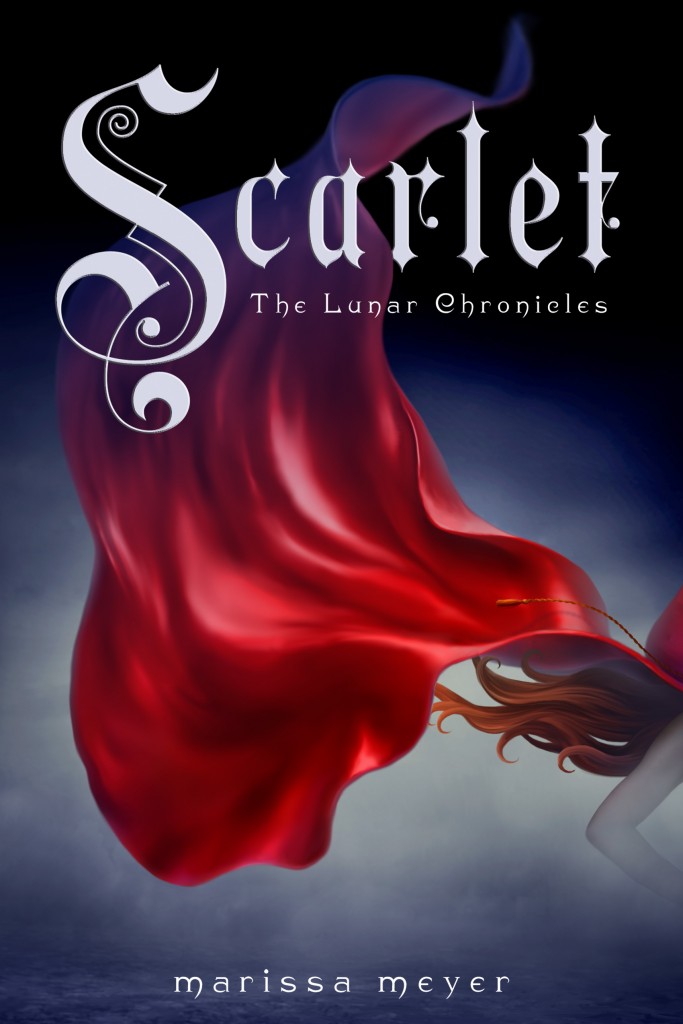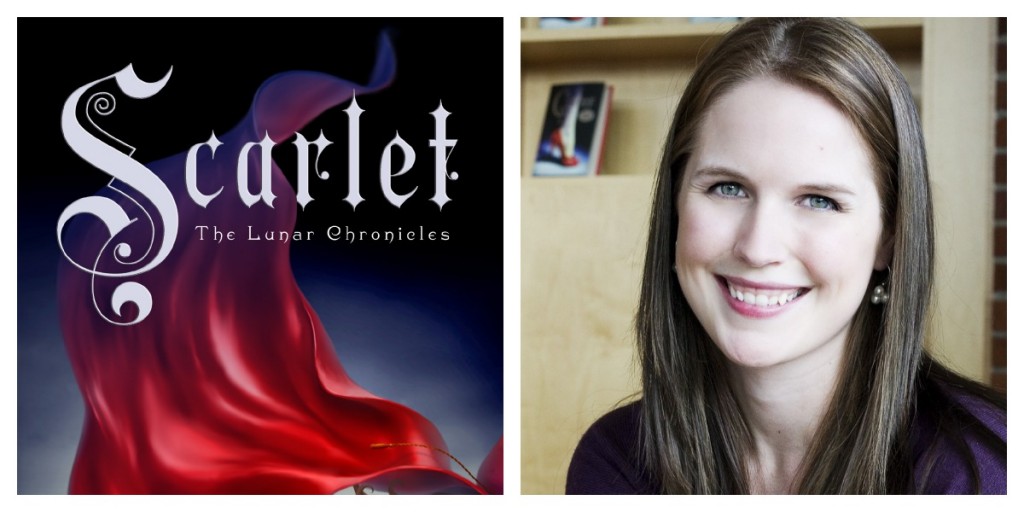Byrt: Marissa, what came first, the cyborg, or the Cinderella?
Marissa Meyer: The Cinderella came first. I had the idea in my head that I wanted to write a series of futuristic fairy tales, and so I’d written up a list of some of my favorite fairy tales, and some of my favorite sci fi tropes, and different ways they could kind of be mixed up and mashed together. And then Cinderella and cyborg just kind of collided in my subconscious after that – and The Lunar Chronicles was born.
Byrt: Now when did you first encounter cyborgs? Was there a book, a movie, a tv show…?
Marissa Meyer: Ooh, probably Star Wars. I mean, I grew up on Star Wars – although I probably didn’t know the term cyborg until, I don’t know, maybe the Borg in Star Trek? Hmmm…
Byrt: So you call yourself a sci fi fan then?
Marissa Meyer: You know, it’s funny, I never really thought of myself as a big sci fi fan – I was definitely much more a fantasy girl growing up. But obviously I had the Star Wars background, with my brother as a huge, huge Star Wars fan. And when I was in my early 20’s I got really hooked on Firefly. And then I also am a big anime fan, and I loved Cowboy Bebop, which is like this space western-
Byrt: -with the best credits sequence ever.
Marissa Meyer: I love it. So awesome. And that’s another cyborg, there are cyborgs in that, too. So you know, I have influences of science fiction, but in general I don’t know that I would really call myself a science fiction fan.
Byrt: So now I have to ask, -what are your favorite, top 5 anime?
Marissa Meyer: Top 5, ok. I have to say Sailor Moon, because it was really what got me started in writing. Cowboy Bebop, Rurouni Kenshin, Howl’s Moving Castle…
Byrt: I’m testing you now.
Marissa Meyer: I know. I don’t know if there’s a 5 that really jumps out at me as being beyond awesome.
 Byrt: So I guess- Is it fair to say that the Asian influence in Cinder came from your love of anime?
Byrt: So I guess- Is it fair to say that the Asian influence in Cinder came from your love of anime?
Marissa Meyer: It definitely was inspired by just kind of my fascination with Asian culture in general. But the main reason, the big reason I chose to set Cinder in futuristic Asia is because I love fairy tales, and I studied fairy tales in college, and I learned at one point that what we think of as our Cinderella story originated in 9th century China. And a lot of scholars think that the whole glass slipper and fitting the smallest foot idea came to Europe from the Chinese foot binding tradition.
Byrt: That is so interesting – so what’s different about the traditional, the original Cinderella, as opposed to the one we tend to think of in the Western world?
Marissa Meyer: The original one, which my memory’s a little foggy, but I know that she met a fish. Like a fish jumped out of a lake, and it was a magical fish, and that was kind of the fairy godmother in the story that somehow was able to get her to the ball. It probably wasn’t called a ball, but she did go off and meet the prince, and she did lose her slipper, and he had to find her through the slipper. So it has a lot of similarities.
Byrt: That gives a very different connotation to the smallest, most delicate…
Marissa Meyer: Yeah, I know. Seriously.
Byrt: Very interesting…
Marissa Meyer: I have to go read that story again, it’s been so long.
Byrt: So, if Cinderella was the inspiration for the first book – with your second book, Scarlet, is it safe to say a different fairy tale is taking center stage?
Marissa Meyer: Yes, Scarlet will be based on Little Red Riding Hood. Book three, Crest, is based on Rapunzel, and Winter is based on Snow White and the Seven Dwarves.
Byrt: Now is there, again, are you looking at kind of the first, original stories behind the fairy tales as inspiration for these?
Marissa Meyer: Yeah, I would say that I take inspiration from both the Grimm tales and also just bits and pieces that you hear. Like Scarlet for example is set in France, and the reason for that is because I heard – I don’t know if it’s true, but I heard at one point that in France, hundreds of years ago, a bunch of murders took place and people at the time believed that it was a werewolf that was doing the killing. And so there was this big hunt to find the werewolf, and that could have played a role in the origin of the Little Red Riding Hood story. So I don’t know if that’s true, but that was what gave me the idea to set it in France. So there are a lot of little tidbits like that that I’ve used in the book.
 Byrt: So are there going to be murders then in this upcoming book?
Byrt: So are there going to be murders then in this upcoming book?
Marissa Meyer: I’m not telling you that! But it will be exciting.
Byrt: (laughs) Now will Cinder still be a main character, or will she be, you know, in jail for most of the story as other characters take center stage?
Marissa Meyer: Cinder is a main character. She’s the hero of the whole series. I don’t really want to give away what’s going to happen to her, but there will be much more Cinder, and much more Kai.
Byrt: Excellent. Now will these books lean – it’s still very much fairy-tale oriented? Or maybe leaning a little bit more towards sci fi paradigms?
Marissa Meyer: I would say they lean more toward science fiction. You know, the series, it’s really taken on such a mind of its own. And you still have the inspiration of the fairy tales, and I’ve tried to drop in little fun hints – in Cinder you have the car being the pumpkin carriage – and so little things like that, I try to keep that up throughout the whole series. But it really just kind of exploded into its entirely own story.
Byrt: Do you have any- you say originally you started- the series came from looking at your favorite sci fi tropes. Can you tell me what some of your favorite sci fi tropes are?
Marissa Meyer: Sexy spaceship captains! I think that’s a good one…
Byrt: (laughs) Named Mal?
Marissa Meyer: Nooooo… (smiles)
Byrt: Perhaps inspired by a Joss Whedon character?
Marissa Meyer: Like a Mal/Han Solo mix…
Byrt: Oh, the rougish typecasting! I like it! Now you must be a Joss Whedon fan…
Marissa Meyer: I love Joss Whedon!
Byrt: Were you also a Buffy fan?
Marissa Meyer: You know, not really…
Byrt: Interesting…
Marissa Meyer: And it’s not because I wouldn’t have loved it if I’d watched it. I just didn’t watch it. I didn’t have anyone telling me, go watch the show. So I didn’t know about it really – I mean I knew about it, but I’d never really seen it until recently.
Byrt: You seem to have a soft spot for the sci fi westerns – with Cowboy Bebop, Firefly..
Marissa Meyer: I know. It’s true, it’s true.
Byrt: Any others?
Marissa Meyer: I also like space operas…
Byrt: Oh, yes. Have you read any good space operas or space cowboy stories recently?
Marissa Meyer: I really love Beth Revis‘s series, Across the Universe. But you know I’m not seeing a whole lot of space opera – in YA at least. You definitely have lots of dystopian, but the space opera I think is something that’s still kind of coming into its own
Byrt: Now I have to ask, from Cinder, how much fun was Iko to write?
Marissa Meyer: I loved Iko! I had no idea – when I was drafting it, and plotting out the book, Iko was just a character. She had some important things to accomplish, plot-wise, but I didn’t expect her to be interesting or fun or anything. And then she would roll into these scenes and just say these completely wacky, off the wall things that no android should be saying, and she was so much fun. I absolutely love her.
Byrt: Is she going to continue? Will we see more of her in the second book?
Marissa Meyer: I’m not telling…
Byrt: Cagey… Is there anything you can tease about the second book?
Marissa Meyer: I can tease that you will meet, in addition to meeting Scarlet, who is very spicy and funky and a lot of fun also, you also will meet two new heroes. One being the sexy spaceship captain, and one – I hesitate to call him a hero, but you will meet Wolf, who is a street fighter who crosses paths with Scarlet and may or may not be up to no good…
Byrt: Well, with a name like Wolf…
Marissa Meyer: (laughs)
Byrt: Is he big and bad?
Marissa Meyer: Well, yeah. (grins)
Byrt: Excellent. So we have Scarlet coming out next year – and what’s the timeline for the rest of the series?
Marissa Meyer: They should be out about a year apart.
Byrt: Have you finished writing them all? Or where are you?
Marissa Meyer: No, I have written drafts of books three and four already, and I’m currently, maybe three-quarters of the way through revisions on book three.
Byrt: So you’re hip deep in the series still – and when, you know, Cinder’s series is done, have you any thoughts about what you’ll work on next? Maybe write that space opera?
Marissa Meyer: I have many, many ideas. There’s a good chance the next book or series will have more of a fantasy element, kind of go back to my roots, ‘cause that’s what I was so in love with when I was a teenager. But I have ideas for fantasies and contemporaries and thrillers, and really everything, so we’ll see.
Byrt: You’ve got four fairy tales covered with this series, is there any other fairy tale next that you’d like to take a stab at?
Marissa Meyer: You know, there are a couple of fairy tales – I would really love to do something with Bluebeard.
Byrt: Ooo yeah…
Marissa Meyer: Which I think is an underrepresented fairy tale. It’s one of my favorites, which is weird because it’s so gory, but yeah. I don’t know, maybe someday.
Byrt: Another good-looking evil rake in your future, perhaps?
Marissa Meyer: Yeees, perhaps so…
Byrt: Alright Marissa, thank you so much for taking the time!
Marissa Meyer: Thank you!
Thanks again to Marissa for chatting with me!
For more on all things Marissa, you can find her website here.
(And our review of Cinder is here)







GREAT Interview! This was a lot of fun to read; such good questions. I love all the anime and fairy tale talk. It’s so interesting to learn about my favorite authors’ interests, inspirations, and roots (and Marissa Meyer is near the top of my list). :)
Thanks Kelley!